Related Research Articles

Australia is a highly developed country with a mixed economy. As of 2023, Australia was the 14th-largest national economy by nominal GDP, the 19th-largest by PPP-adjusted GDP, and was the 21st-largest goods exporter and 24th-largest goods importer. Australia took the record for the longest run of uninterrupted GDP growth in the developed world with the March 2017 financial quarter. It was the 103rd quarter and the 26th year since the country had a technical recession. As of June 2021, the country's GDP was estimated at $1.98 trillion.

Asia-Pacific Economic Cooperation is an inter-governmental forum for 21 member economies in the Pacific Rim that promotes free trade throughout the Asia-Pacific region. Following the success of ASEAN's series of post-ministerial conferences launched in the mid-1980s, APEC started in 1989, in response to the growing interdependence of Asia-Pacific economies and the advent of regional trade blocs in other parts of the world; it aimed to establish new markets for agricultural products and raw materials beyond Europe. Headquartered in Singapore, APEC is recognized as one of the highest-level multilateral blocs and oldest forums in the Asia-Pacific region, and exerts significant global influence.
The Canada China Business Council, or CCBC, is a private, non-profit business association founded in 1978 to facilitate and promote business, trade, and investment between Canada and the People's Republic of China. CCBC has offices in Toronto, Vancouver, Montreal, Calgary, Halifax, Beijing, and Shanghai. CCBC is the de facto Canadian chamber of commerce in Beijing. It also has business incubators in Beijing, Shanghai, Montreal, and Calgary to help Canadian companies grow in China and Chinese investors succeed in Canada.
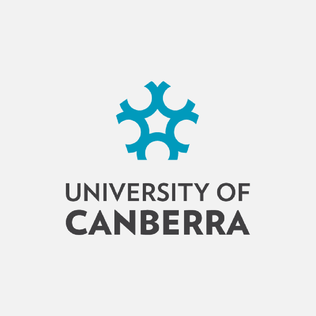
The University of Canberra (UC) is a public research university with its main campus located in Bruce, Canberra, Australian Capital Territory. The campus is 2.5 km (1.6 mi) from Belconnen Town Centre, and 8.7 km (5.4 mi) from Canberra's Civic Centre. UC offers undergraduate and postgraduate courses through five faculties: Arts and Design; Business, Government and Law; Education; Health; and Science and Technology.

The Department of Foreign Affairs and Trade (DFAT) is the department of the Australian federal government responsible for foreign policy and relations, international aid, consular services and trade and investment. Australia's total official development assistance (ODA) decreased in 2022 due to differences in Australia's financial year reporting and the timing of its COVID-19-related expenditure, representing 0.19% of gross national income (GNI).
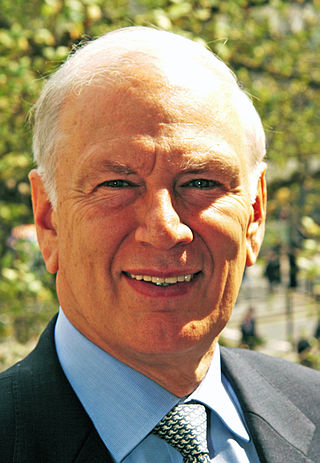
Richard Kenneth Robert Alston is an Australian businessman, former politician and former barrister. He served as a Senator for Victoria from 1986 to 2004, representing the Liberal Party. During the Howard government he held ministerial office as Minister for Communications and the Arts (1996–1997), Communications, the Information Economy and the Arts (1997–1998), and Communications, Information Technology and the Arts (1998–2003). He is simultaneously Australia's longest serving Communications minister and Arts minister.
The Australian Trade and Investment Commission, or Austrade, is the Australian Government's trade, investment and education promotion agency which was also given responsibility for tourism policy, programs and research from 2013. Austrade was established under the Australian Trade Commission Act 1985. It is a non-corporate Commonwealth entity under the Public Governance, Performance and Accountability Act 2013, and a statutory agency under the Public Service Act 1999. Austrade is part of the Foreign Affairs and Trade portfolio.
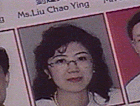
Liu Chaoying (劉超英), or Helen Liu, is a former executive at China Aerospace International Holdings which is the Hong Kong subsidiary of China's premier satellite developer, China Aerospace Science and Technology Corporation (中國航天科技集團公司). She is a Lt. Col. in the People's Liberation Army (PLA) of China. Liu played a major role in the 1996 United States campaign finance controversy.

The China–Australia Free Trade Agreement (ChAFTA) is a bilateral free trade agreement (FTA) between the governments of Australia and China. Since negotiations began, 21 negotiating rounds have been completed. The deal was completed on 17 November 2014 and details released two days later, nearly 10 years after its first round of negotiations that began on 23 May 2005 after a joint feasibility study. The free trade agreement was signed between the two countries on 17 June 2015. Following the usual treaty making process the agreement came into force on 20 December 2015, after the Chinese Government completed its domestic legal and legislative processes and the Australian Parliament’s Joint Standing Committee on Treaties and the Senate Foreign Affairs, Defence and Trade References Committee finished a review.

Consular relations between China and Australia were first established in 1909, and diplomatic relations were established in 1941. Australia continued to recognise the Republic of China (ROC) government after it lost the Chinese Civil War and retreated to Taiwan in 1949, but switched recognition to the People's Republic of China (PRC) on 21 December 1972. Chinese Australians have been a significant minority group in the country since the Qing dynasty.
The China–Britain Business Council (CBBC) is the leading British organisation promoting trade and investment between the UK and China.

Australia and Italy established formal diplomatic relations in 1949. Francesca Tardioli was appointed Italian ambassador to Australia in September 2019, the first woman to represent Italy in Australia until her death in February 2022. The headquarters of the Italian embassy, designed by the Italian-Australian architect Enrico Taglietti, is located in the Canberra district of Deakin. Margaret Twomey was appointed Australian ambassador in Rome in July 2020.

Foreign diplomatic relations between Australia and India are well-established, with both nations sharing a "Comprehensive Strategic Partnership" since both were part of the British Empire. Both are members of the Commonwealth of Nations, and share political, economic, security, lingual and sporting ties. Besides strong trading & migration, culture, arts, music, commercial & international sports like cricket, tennis, badminton have emerged as a strong cultural connection between the two nations. Military cooperation between Australia and India includes the regular joint naval exercise AUSINDEX. Both countries are part of the Quad.

Paul Glasson is an Australian investor and businessman. He is the chairman of Satori Investments Greater China and a life member of the Australia China Business Council, awarded for his many years' service leading the council's presence in China between 2008 and 2014. He lived in China from the mid-1990s until returning to Australia in 2018, and is recognised in industry as one of the foremost experts on outbound investments by Chinese enterprises. In 2009 he was described by The Australian newspaper as one of the most influential Australians living in China.

Australia and Singapore share longstanding and multifaceted relations, elevated by the establishment of the Comprehensive Strategic Partnership (CSP) in 2015. Australia was the first country to establish diplomatic relations with Singapore upon its independence in 1965. Both countries also work closely in multilateral fora and enjoy warm people-to-people relations.

Fiji–Russia relations refers to bilateral relations between Fiji and Russia. Neither country has a resident ambassador, the Ambassador of Russia in Fiji is Alexander Blokhin who also is the Ambassador to Australia, Vanuatu and Nauru. He is stationed in Canberra, Australia.

The Australian Catholic Bishops’ Conference (ACBC) is the national episcopal conference of the Catholic bishops of Australia and is the instrumentality used by the Australian Catholic bishops to act nationally and address issues of national significance. Formation of the ACBC was approved by the Holy See on 21 June 1966. With around 5.4 million Catholics in Australia, the ACBC is an influential national body.
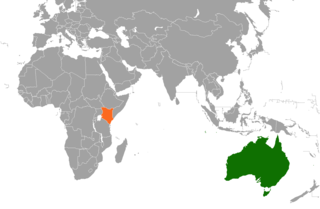
Bilateral relations exist between Australia and Kenya. Both Australia and Kenya were formerly part of the British Empire, although not simultaneously, and are current member states of the Commonwealth of Nations. As of 2020, both Commonwealth nations have maintained bilateral relations for 55 years.
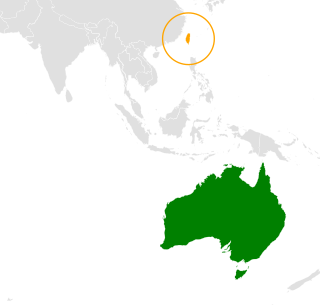
Relations between the Commonwealth of Australia and the Republic of China, formerly the Qing dynasty, date back to 1909. The two countries had official diplomatic relations from 1941 to 1972. Since 1972, Australia no longer has formal diplomatic relations with Republic of China (Taiwan). Australia and Taiwan share partnership in the inter-governmental Global Cooperation and Training Framework (GCTF) activities.

The Indonesia–Australia Comprehensive Economic Partnership Agreement is a bilateral agreement signed between Australia and Indonesia in March 2019, ratified by Australia in November 2019 and Indonesia in February 2020. The agreement contains a free trade agreement removing tariffs from nearly all products traded between both countries, in addition to loosening investment regulations in Indonesia for Australian firms and increasing the quota for Indonesians seeking vocational training in Australia.
References
- 1 2 "The Australia China Business Council". www.acbc.com.au. Retrieved 21 November 2017.
- ↑ "About". The Australia China Business Council. Retrieved 11 March 2021.
- ↑ "Canberra Networking Day". ACBC 2017 Canberra Networking Day. Retrieved 21 November 2017.